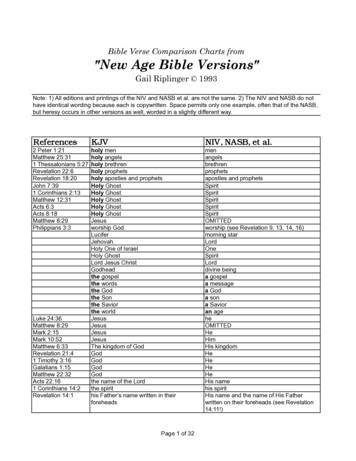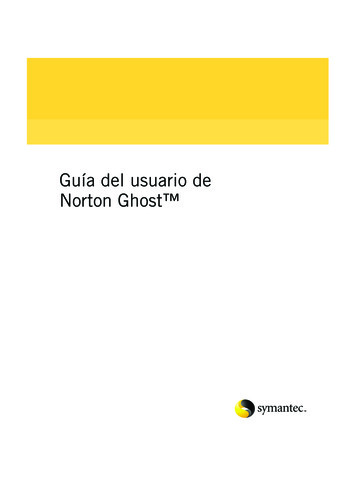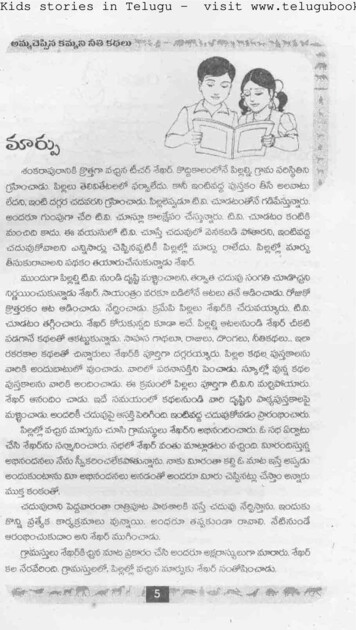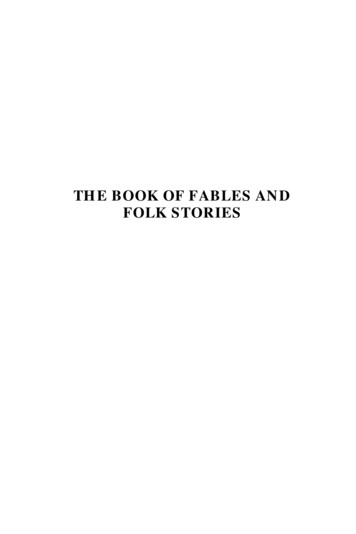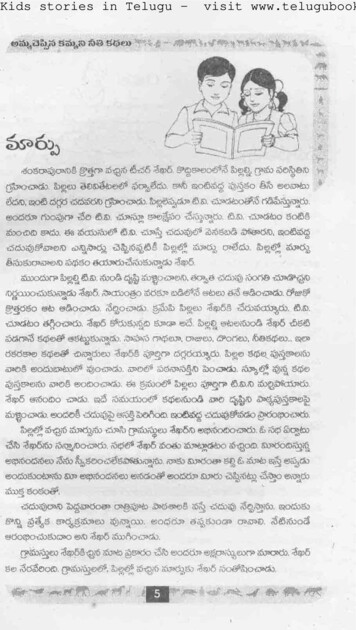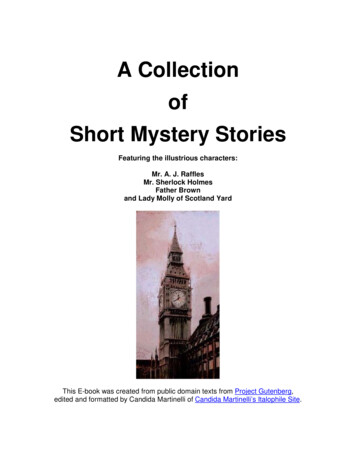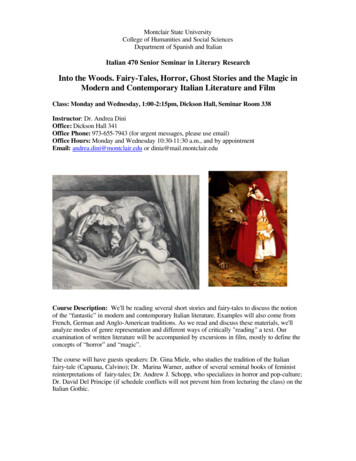
Transcription
The Project Gutenberg eBook, The Best Ghost Stories, by VariousThis eBook is for the use of anyone anywhere at no cost and withalmost no restrictions whatsoever. You may copy it, give it away orre-use it under the terms of the Project Gutenberg License includedwith this eBook or online at www.gutenberg.orgTitle: The Best Ghost StoriesAuthor: VariousRelease Date: March 1, 2006 [eBook #17893]Language: EnglishCharacter set encoding: ISO-8859-1***START OF THE PROJECT GUTENBERG EBOOK THE BEST GHOSTSTORIES***E-text prepared by Suzanne Lybarger, Brian Janes, Emmy,and the Project Gutenberg Online Distributed Proofreading Team(http://www.pgdp.net/)THE MODERN LIBRARYOF THE WORLD'S BEST BOOKS
BEST GHOST STORIES
THE BEST GHOSTSTORIESINTRODUCTION BY ARTHUR B. REEVETHE MODERN LIBRARYPUBLISHERS::::NEW YORKCOPYRIGHT, 1919, BYBONI & LIVERIGHT, Inc.MANUFACTURED IN THE UNITED STATES OF AMERICA BY H. WOLFF
CONTENTSPAGEINTRODUCTION—"THE FASCINATION OF THE GHOSTSTORY"THE APPARITION OF MRS. VEALCANON ALBERIC'S SCRAP-BOOKTHE HAUNTED AND THE HAUNTERSTHE SILENT WOMANBANSHEESTHE MAN WHO WENT TOO FARTHE WOMAN'S GHOST STORYTHE PHANTOM RICKSHAWTHE RIVAL GHOSTSTHE DAMNED THINGTHE INTERVALDEY AIN'T NO GHOSTSSOME REAL AMERICAN GHOSTSArthur B. Reeve viiDaniel De Foe 3Montague Rhodes18JamesEdward Bulwer-Lytton 31Leopold Kompert 6079E.F. Benson 85Algernon Blackwood 108Rudyard Kipling 118Brander Matthews 141Ambrose Bierce 160Vincent O'Sullivan 170Ellis Parker Butler 177188
INTRODUCTION
THE FASCINATION OF THE GHOSTSTORYARTHUR B. REEVEWhat is the fascination we feel for the mystery of the ghost story?Is it of the same nature as the fascination which we feel for the mystery of thedetective story?Of the latter fascination, the late Paul Armstrong used to say that it wasbecause we are all as full of crime as Sing Sing—only we don't dare.Thus, may I ask, are we not fascinated by the ghost story because, no matterwhat may be the scientific or skeptical bent of our minds, in our inmost souls,secretly perhaps, we are as full of superstition as an obeah man—only we don'tlet it loose?Who shall say that he is able to fling off lightly the inheritance of countlessages of superstition? Is there not a streak of superstition in us all? We laugh atthe voodoo worshiper—then create our own hoodooes, our pet obsessions.It has been said that man is incurably religious, that if all religions wereblotted out, man would create a new religion.Man is incurably fascinated by the mysterious. If all the ghost stories of theages were blotted out, man would invent new ones.For, do we not all stand in awe of that which we cannot explain, of thatwhich, if it be not in our own experience, is certainly recorded in the experienceof others, of that of which we know and can know nothing?Skeptical though one may be of the occult, he must needs be interested inthings that others believe to be objective—that certainly are subjectively veryreal to them.The ghost story is not born of science, nor even of super-science, whateverthat may be. It is not of science at all. It is of another sphere, despite all that the
psychic researchers have tried to demonstrate.There are in life two sorts of people who, for want of a better classification, Imay call the psychic and the non-psychic. If I ask the psychic to close his eyesand I say to him, "Horse," he immediately visualizes a horse. The other, nonpsychic, does not. I rather incline to believe that it is the former class who seeghosts, or rather some of them. The latter do not—though they share interest inthem.The artists are of the visualizing class and, in our more modern times, it is thepsychic who think in motion pictures, or at least in a succession of still pictures.However we explain the ghostly and supernatural, whether we give itobjective or merely subjective reality, neither explanation prevents the nonpsychic from being intensely interested in the visions of the psychic.Thus I am convinced that if we were all quite honest with ourselves, whetherwe believe in or do not believe in ghosts, at least we are all deeply interested inthem. There is in this interest something that makes all the world akin.Who does not feel a suppressed start at the creaking of furniture in the dark ofnight? Who has not felt a shiver of goose flesh, controlled only by an effort ofwill? Who, in the dark, has not had the feeling of some thing behind him—and,in spite of his conscious reasoning, turned to look?If there be any who has not, it may be that to him ghost stories have nofascination. Let him at least, however, be honest.To every human being mystery appeals, be it that of the crime cases on whicha large part of yellow journalism is founded, or be it in the cases of Dupin, of LeCoq, of Sherlock Holmes, of Arsene Lupin, of Craig Kennedy, or a host ofothers of our fiction mystery characters. The appeal is in the mystery.The detective's case is solved at the end, however. But even at the end of aghost story, the underlying mystery remains. In the ghost story, we have the veryquintessence of mystery.Authors, publishers, editors, dramatists, writers of motion pictures tell us thatnever before has there been such an intense and wide interest in mystery storiesas there is to-day. That in itself explains the interest in the super-mystery story ofthe ghost and ghostly doings.
Another element of mystery lies in such stories. Deeper and further back, isthe supreme mystery of life—after death—what?"Impossible," scorns the non-psychic as he listens to some ghost story.To which, doggedly replies the mind of the opposite type, "Not so. I believebecause it is impossible."The uncanny, the unhealthy—as in the master of such writing, Poe—fascinates. Whether we will or no, the imp of the perverse lures us on.That is why we read with enthralled interest these excursions into the eerieunknown, perhaps reading on till the mystic hour of midnight increases thecreepy pleasure.One might write a volume of analysis and appreciation of this aptly balancedanthology of ghost stories assembled here after years of reading and study byMr. J.L. French.Foremost among the impressions that a casual reader will derive is theinteresting fact, just as in detective mystery stories, so in ghost stories, styleschange. Each age, each period has the ghost story peculiar to itself. To-day, thereis a new style of ghost story gradually evolving.Once stories were of fairies, fays, trolls, the "little people," of poltergiest andloup garou. Through various ages we have progressed to the ghost story of theeighteenth and nineteenth centuries until to-day, in the twentieth, we are seeing amodern style, which the new science is modifying materially.High among the stories in this volume, one must recognize the masterful artof Algernon Blackwood's "The Woman's Ghost Story.""I was interested in psychic things," says the woman as she starts to tell herstory simply, with a sweep toward the climax that has the ring of the truth offiction. Here perhaps we have the modern style of ghost story at its best.Times change as well as styles. "The Man Who Went Too Far" is of intenseinterest as an attempt to bring into our own times an interpretation of thesymbolism underlying Greek mythology, applied to England of some years ago.To see Pan meant death. Hence in this story there is a philosophy of Pantheism—no "me," no "you," no "it." It is a mystical story, with a storm scene in
which is painted a picture that reminds one strongly of "The Fall of the House ofUshur,"—with the frankly added words, "On him were marks of hoofs of amonstrous goat that had leaped on him,"—uncompromising mysticism.Happy is the Kipling selection, "The Phantom 'Rickshaw," if only for thatobiter dictum of ghost-presence as Kipling explains about the rift in the brain:"—and a little bit of the Dark World came through and pressed him to death!"Then there are the racial styles in ghost stories. The volume takes us from the"Banshees and Other Death Warnings" of Ireland to a strange example of Jewishmysticism in "The Silent Woman." Mr. French has been very wide in his choice,giving us these as well as many examples from the literature of England andFrance. Finally, he has compiled from the newspapers, as typically American,many ghost stories of New York and other parts of the country.Strange that one should find humor in a subject so weird. Yet we find it. Take,for instance, De Foe's old narrative, "The Apparition of Mrs. Veal." It is a hoax,nothing more. Of our own times is Ellis Parker Butler's "Dey Ain't No Ghosts,"showing an example of the modern Negro's racial heritage.In our literature and on the stage, the very idea of a Darky and a graveyard ismirth-provoking. Mr. Butler extracts some pithy philosophy from his Darky boy:"I ain't skeered ob ghosts whut am, c'ase dey ain't no ghosts, but I jes' feel kinderoneasy 'bout de ghosts whut ain't!"Humor is succeeded by pathos. In "The Interval" we find a sympathetic twistto the ghost story—an actual desire to meet the dead.It is not, however, to be compared for interest to the story of sheer terror, as inBulwer-Lytton's "The Haunted and the Haunters," with the flight of the servantin terror, the cowering of the dog against the wall, the death of the dog, its neckactually broken by the terror, and all that go to make an experience in a hauntedhouse what it should be.Thus, at last, we come to two of the stories that attempt to give a scientificexplanation, another phase of the modern style of ghost story.One of these, perhaps hardly modern as far as mere years are concerned, isthis same story of Bulwer, "The Haunted and the Haunters." Besides being arattling good old-fashioned tale of horror, it attempts a new-fashioned scientificexplanation. It is enough to read and re-read it.
It is, however, the lamented Ambrose Bierce who has gone furthest in thescience and the philosophy of the matter, and in a very short story, too,splendidly titled "The Damned Thing.""Incredible!" exclaims the coroner at the inquest."That is nothing to you, sir," replies the newspaper man whorelates the experience, and in these words expresses the true feelingabout ghostly fiction, "that is nothing to you, if I also swear that it istrue!"But furthest of all in his scientific explanation—not scientifically explainingaway, but in explaining the way—goes Bierce as he outlines a theory. From thediary of the murdered man he picks out the following which we may treasure asa gem:"I am not mad. There are colors that we cannot see. And—Godhelp me!—the Damned Thing is of such a color!"This fascination of the ghost story—have I made it clear?As I write, nearing midnight, the bookcase behind me cracks. I start and turn.Nothing. There is a creak of a board in the hallway.I know it is the cool night wind—the uneven contraction of materialsexpanded in the heat of the day.Yet—do I go into the darkness outside otherwise than alert?It is this evolution of our sense of ghost terror—ages of it—that fascinates us.Can we, with a few generations of modernism behind us, throw it off with allour science? And, if we did, should we not then succeed only in abolishing theold-fashioned ghost story and creating a new, scientific ghost story?Scientific? Yes. But more,—something that has existed since the beginningsof intelligence in the human race.Perhaps, you critic, you say that the true ghost story originated in the age ofshadowy candle light and pine knot with their grotesqueries on the walls and inthe unpenetrated darkness, that the electric bulb and the radiator have dispelledthat very thing on which, for ages, the ghost story has been built.
What? No ghost stories? Would you take away our supernatural fiction byyour paltry scientific explanation?Still will we gather about the story teller—then lie awake o' nights, seeingmocking figures, arms akimbo, defying all your science to crush the ghost story.
BEST GHOST STORIES
THE APPARITION OF MRS. VEALBY DANIEL DE FOETHE PREFACEThis relation is matter of fact, and attended with such circumstances, as mayinduce any reasonable man to believe it. It was sent by a gentleman, a justice ofpeace, at Maidstone, in Kent, and a very intelligent person, to his friend inLondon, as it is here worded; which discourse is attested by a very sober andunderstanding gentlewoman, a kinswoman of the said gentleman's, who lives inCanterbury, within a few doors of the house in which the within-named Mrs.Bargrave lives; who believes his kinswoman to be of so discerning a spirit, asnot to be put upon by any fallacy; and who positively assured him that the wholematter, as it is related and laid down, is really true; and what she herself had inthe same words, as near as may be, from Mrs. Bargrave's own mouth, who, sheknows, had no reason to invent and publish such a story, or any design to forgeand tell a lie, being a woman of much honesty and virtue, and her whole life acourse, as it were, of piety. The use which we ought to make of it, is to consider,that there is a life to come after this, and a just God, who will retribute to everyone according to the deeds done in the body; and therefore to reflect upon ourpast course of life we have led in the world; that our time is short and uncertain;and that if we would escape the punishment of the ungodly, and receive thereward of the righteous, which is the laying hold of eternal life, we ought, for thetime to come, to return to God by a speedy repentance, ceasing to do evil, andlearning to do well: to seek after God early, if happily He may be found of us,and lead such lives for the future, as may be well pleasing in His sight.A RELATION OF THE APPARITION OF MRS. VEALThis thing is so rare in all its circumstances, and on so good authority, that myreading and conversation has not given me anything like it: it is fit to gratify themost ingenious and serious inquirer. Mrs. Bargrave is the person to whom Mrs.
Veal appeared after her death; she is my intimate friend, and I can avouch for herreputation, for these last fifteen or sixteen years, on my own knowledge; and Ican confirm the good character she had from her youth, to the time of myacquaintance. Though, since this relation, she is calumniated by some people,that are friends to the brother of this Mrs. Veal, who appeared; who think therelation of this appearance to be a reflection, and endeavor what they can to blastMrs. Bargrave's reputation, and to laugh the story out of countenance. But by thecircumstances thereof, and the cheerful disposition of Mrs. Bargrave,notwithstanding the ill-usage of a very wicked husband, there is not yet the leastsign of dejection in her face; nor did I ever hear her let fall a desponding ormurmuring expression; nay, not when actually under her husband's barbarity;which I have been witness to, and several other persons of undoubted reputation.Now you must know, Mrs. Veal was a maiden gentlewoman of about thirtyyears of age, and for some years last past had been troubled with fits; whichwere perceived coming on her, by her going off from her discourse very abruptlyto some impertinence. She was maintained by an only brother, and kept hishouse in Dover. She was a very pious woman, and her brother a very sober manto all appearance; but now he does all he can to null or quash the story. Mrs. Vealwas intimately acquainted with Mrs. Bargrave from her childhood. Mrs. Veal'scircumstances were then mean; her father did not take care of his children as heought, so that they were exposed to hardships; and Mrs. Bargrave, in those days,had as unkind a father, though she wanted neither for food nor clothing, whilstMrs. Veal wanted for both; insomuch that she would often say, Mrs. Bargrave,you are not only the best, but the only friend I have in the world, and nocircumstances of life shall ever dissolve my friendship. They would oftencondole each other's adverse fortunes, and read together Drelincourt upon Death,and other good books; and so, like two Christian friends, they comforted eachother under their sorrow.Some time after, Mr. Veal's friends got him a place in the custom-house atDover, which occasioned Mrs. Veal, by little and little, to fall off from herintimacy with Mrs. Bargrave, though there was never any such thing as aquarrel; but an indifferency came on by degrees, till at last Mrs. Bargrave hadnot seen her in two years and a half; though above a twelvemonth of the timeMrs. Bargrave hath been absent from Dover, and this last half year has been inCanterbury about two months of the time, dwelling in a house of her own.In this house, on the 8th of September, 1705, she was sitting alone in theforenoon, thinking over her unfortunate life, and arguing herself into a due
resignation to providence, though her condition seemed hard. And, said she, Ihave been provided for hitherto, and doubt not but I shall be still; and am wellsatisfied that my afflictions shall end when it is most fit for me: and then took upher sewing-work, which she had no sooner done, but she hears a knocking at thedoor. She went to see who was there, and this proved to be Mrs. Veal, her oldfriend, who was in a riding-habit. At that moment of time the clock struck twelveat noon.Madam, says Mrs. Bargrave, I am surprised to see you, you have been so longa stranger; but told her, she was glad to see her, and offered to salute her; whichMrs. Veal complied with, till their lips almost touched; and then Mrs. Veal drewher hand across her own eyes, and said, I am not very well; and so waived it. Shetold Mrs. Bargrave, she was going a journey, and had a great mind to see herfirst. But, says Mrs. Bargrave, how came you to take a journey alone? I amamazed at it, because I know you have a fond brother. Oh! says Mrs. Veal, I gavemy brother the slip, and came away because I had so great a desire to see youbefore I took my journey. So Mrs. Bargrave went in with her, into another roomwithin the first, and Mrs. Veal sat her down in an elbow-chair, in which Mrs.Bargrave was sitting when she heard Mrs. Veal knock. Then says Mrs. Veal, Mydear friend, I am come to renew our old friendship again, and beg your pardonfor my breach of it; and if you can forgive me, you are the best of women. O,says Mrs. Bargrave, do not mention such a thing; I have not had an uneasythought about it; I can easily forgive it. What did you think of me? said Mrs.Veal. Says Mrs. Bargrave, I thought you were like the rest of the world, and thatprosperity had made you forget yourself and me. Then Mrs. Veal reminded Mrs.Bargrave of the many friendly offices she did her in former days, and much ofthe conversation they had with each other in the times of their adversity; whatbooks they read, and what comfort, in particular, they received fromDrelincourt's Book of Death, which was the best, she said, on that subject everwritten. She also mentioned Dr. Sherlock, the two Dutch books which weretranslated, written upon death, and several others. But Drelincourt, she said, hadthe clearest notions of death, and of the future state, of any who had handled thatsubject. Then she asked Mrs. Bargrave, whether she had Drelincourt. She said,Yes. Says Mrs. Veal, Fetch it. And so Mrs. Bargrave goes up stairs and brings itdown. Says Mrs. Veal, Dear Mrs. Bargrave, if the eyes of our faith were as openas the eyes of our body, we should see numbers of angels about us for our guard.The notions we have of heaven now, are nothing like what it is, as Drelincourtsays; therefore be comforted under your afflictions, and believe that theAlmighty has a particular regard to you; and that your afflictions are marks of
God's favor; and when they have done the business they are sent for, they shallbe removed from you. And believe me, my dear friend, believe what I say toyou, one minute of future happiness will infinitely reward you for all yoursufferings. For, I can never believe (and claps her hand upon her knee with greatearnestness, which indeed ran through most of her discourse), that ever God willsuffer you to spend all your days in this afflicted state; but be assured, that yourafflictions shall leave you, or you them, in a short time. She spake in thatpathetical and heavenly manner, that Mrs. Bargrave wept several times, she wasso deeply affected with it.Then Mrs. Veal mentioned Dr. Kenrick's Ascetick, at the end of which hegives an account of the lives of the primitive Christians. Their pattern sherecommended to our imitation, and said, their conversation was not like this ofour age: For now, says she, there is nothing but frothy, vain discourse, which isfar different from theirs. Theirs was to edification, and to build one another up infaith; so that they were not as we are, nor are we as they were: but, says she, weought to do as they did. There was an hearty friendship among them; but whereis it now to be found? Says Mrs. Bargrave, It is hard indeed to find a true friendin these days. Says Mrs. Veal, Mr. Norris has a fine copy of verses, calledFriendship in Perfection, which I wonderfully admire. Have you seen the book?says Mrs. Veal. No, says Mrs. Bargrave, but I have the verses of my own writingout. Have you? says Mrs. Veal, then fetch them. Which she did from abovestairs, and offered them to Mrs. Veal to read, who refused, and waived the thing,saying, holding down her head would make it ache; and then desired Mrs.Bargrave to read them to her, which she did. As they were admiring friendship,Mrs. Veal said, Dear Mrs. Bargrave, I shall love you for ever. In these versesthere is twice used the word Elysian. Ah! says Mrs. Veal, these poets have suchnames for heaven. She would often draw her hands across her own eyes, and say,Mrs. Bargrave, do not you think I am mightily impaired by my fits? No, saysMrs. Bargrave, I think you look as well as ever I knew you. After all thisdiscourse, which the apparition put in much finer words than Mrs. Bargrave saidshe could pretend to, and as much more than she can remember, (for it cannot bethought, that an hour and three quarters' conversation could all be retained,though the main of it she thinks she does,) she said to Mrs. Bargrave, she wouldhave her write a letter to her brother, and tell him, she would have him give ringsto such and such; and that there was a purse of gold in her cabinet, and that shewould have two broad pieces given to her cousin Watson.Talking at this rate, Mrs. Bargrave thought that a fit was coming upon her,
and so placed herself in a chair just before her knees, to keep her from falling tothe ground, if her fits should occasion it: for the elbow-chair, she thought, wouldkeep her from falling on either side. And to divert Mrs. Veal, as she thought,took hold of her gown-sleeve several times, and commended it. Mrs. Veal toldher, it was a scowered silk, and newly made up. But for all this, Mrs. Vealpersisted in her request, and told Mrs. Bargrave, she must not deny her: and shewould have her tell her brother all their conversation, when she had opportunity.Dear Mrs. Veal, says Mrs. Bargrave, this seems so impertinent, that I cannot tellhow to comply with it; and what a mortifying story will our conversation be to ayoung gentleman? Why, says Mrs. Bargrave, it is much better, methinks, to do ityourself. No, says Mrs. Veal, though it seems impertinent to you now, you willsee more reason for it hereafter. Mrs. Bargrave then, to satisfy her importunity,was going to fetch a pen and ink; but Mrs. Veal said, Let it alone now, but do itwhen I am gone; but you must be sure to do it: which was one of the last thingsshe enjoined her at parting; and so she promised her.Then Mrs. Veal asked for Mrs. Bargrave's daughter; she said, she was not athome: But if you have a mind to see her, says Mrs. Bargrave, I'll send for her.Do, says Mrs. Veal. On which she left her, and went to a neighbor's to seek forher; and by the time Mrs. Bargrave was returning, Mrs. Veal was got without thedoor in the street, in the face of the beast-market, on a Saturday, which ismarket-day, and stood ready to part, as soon as Mrs. Bargrave came to her. Sheasked her, why she was in such haste. She said she must be going, thoughperhaps she might not go her journey till Monday; and told Mrs. Bargrave, shehoped she should see her again at her cousin Watson's, before she went whithershe was going. Then she said, she would take her leave of her, and walked fromMrs. Bargrave in her view, till a turning interrupted the sight of her, which wasthree quarters after one in the afternoon.Mrs. Veal died the 7th of September, at twelve o'clock at noon of her fits, andhad not above four hours' senses before her death, in which time she received thesacrament. The next day after Mrs. Veal's appearing, being Sunday, Mrs.Bargrave was mightily indisposed with a cold, and a sore throat, that she couldnot go out that day; but on Monday morning she sent a person to CaptainWatson's, to know if Mrs. Veal was there. They wondered at Mrs. Bargrave'sinquiry; and sent her word, that she was not there, nor was expected. At thisanswer Mrs. Bargrave told the maid she had certainly mistook the name, or madesome blunder. And though she was ill, she put on her hood, and went herself toCaptain Watson's though she knew none of the family, to see if Mrs. Veal was
there or not. They said, they wondered at her asking, for that she had not been intown; they were sure, if she had, she would have been there. Says Mrs. Bargrave,I am sure she was with me on Saturday almost two hours. They said, it wasimpossible; for they must have seen her if she had. In comes Captain Watson,while they were in dispute, and said, that Mrs. Veal was certainly dead, and herescutcheons were making. This strangely surprised Mrs. Bargrave, when she sentto the person immediately who had the care of them, and found it true. Then sherelated the whole story to Captain Watson's family, and what gown she had on,and how striped; and that Mrs. Veal told her, it was scowered. Then Mrs. Watsoncried out, You have seen her indeed, for none knew, but Mrs. Veal and myself,that the gown was scowered. And Mrs. Watson owned, that she described thegown exactly: For, said she, I helped her to make it up. This Mrs. Watson blazedall about the town, and avouched the demonstration of the truth of Mrs.Bargrave's seeing Mrs. Veal's apparition. And Captain Watson carried twogentlemen immediately to Mrs. Bargrave's house, to hear the relation of her ownmouth. And when it spread so fast, that gentlemen and persons of quality, thejudicious and skeptical part of the world, flocked in upon her, it at last becamesuch a task, that she was forced to go out of the way. For they were, in general,extremely satisfied of the truth of the thing, and plainly saw that Mrs. Bargravewas no hypochondraic; for she always appears with such a cheerful air, andpleasing mien, that she has gained the favor and esteem of all the gentry; and itis thought a great favor, if they can but get the relation from her own mouth. Ishould have told you before, that Mrs. Veal told Mrs. Bargrave, that her sisterand brother-in-law were just come down from London to see her. Says Mrs.Bargrave, How came you to order matters so strangely? It could not be helped,says Mrs. Veal. And her brother and sister did come to see her, and entered thetown of Dover just as Mrs. Veal was expiring. Mrs. Bargrave, asked her, whethershe would drink some tea. Says Mrs. Veal, I do not care if I do; but I'll warrantyou, this mad fellow (meaning Mrs. Bargrave's husband) has broke all yourtrinkets. But, says Mrs. Bargrave, I'll get something to drink in for all that; butMrs. Veal waived it, and said, It is no matter, let it alone; and so it passed.All the time I sat with Mrs. Bargrave, which was some hours, she recollectedfresh sayings of Mrs. Veal. And one material thing more she told Mrs. Bargrave,that old Mr. Breton allowed Mrs. Veal ten pounds a year; which was a secret, andunknown to Mrs. Bargrave, till Mrs. Veal told it her.Mrs. Bargrave never varies in her story; which puzzles those who doubt ofthe truth, or are unwilling to believe it. A servant in the neighbor's yard,
adjoining to Mrs. Bargrave's house, heard her talking to somebody an hour of thetime Mrs. Veal was with her. Mrs. Bargrave went out to her next neighbor's thevery moment she parted with Mrs. Veal, and told her what ravishingconversation she had with an old friend, and told the whole of it. Drelincourt'sBook of Death is, since this happened, bought up strangely. And it is to beobserved, that notwithstanding all the trouble and fatigue Mrs. Bargrave hasundergone upon this account, she never took the value of a farthing, nor sufferedher daughter to take anything of anybody, and therefore can have no interest intelling the story.But Mr. Veal does what he can to stifle the matter, and said, he would seeMrs. Bargrave; but yet it is certain matter of fact that he has been at CaptainWatson's since the death of his sister, and yet never went near Mrs. Bargrave;and some of his friends report her to be a liar, and that she knew of Mr. Breton'sten pounds a year. But the person who pretends to say so, has the reputation of anotorious liar, among persons whom I know to be of undoubted credit. Now Mr.Veal is more of a gentleman than to say she lies; but says, a bad husband hascrazed her. But she needs only present herself, and it will effectually confute thatpretense. Mr. Veal says, he asked his sister on her death-bed, whether she had amind to dispose of anything? And she said, No. Now, the things which Mrs.Veal's apparition would have disposed of, were so trifling, and nothing of justiceaimed at in their disposal, that the design of it appears to me to be only in orderto make Mrs. Bargrave so to demonstrate the truth of her appearance, as tosatisfy the world of the reality thereof, as to what she had seen and heard; and tosecure her reputation among the reasonable and understanding part of mankind.And then again, Mr. Veal owns,
anthology of ghost stories assembled here after years of reading and study by Mr. J.L. French. Foremost among the impressions that a casual reader will derive is the interesting fact, just as in detective mystery stories, so in ghost stories, styles change. Each age, each period has the ghost story peculiar to itself. To-day, there


